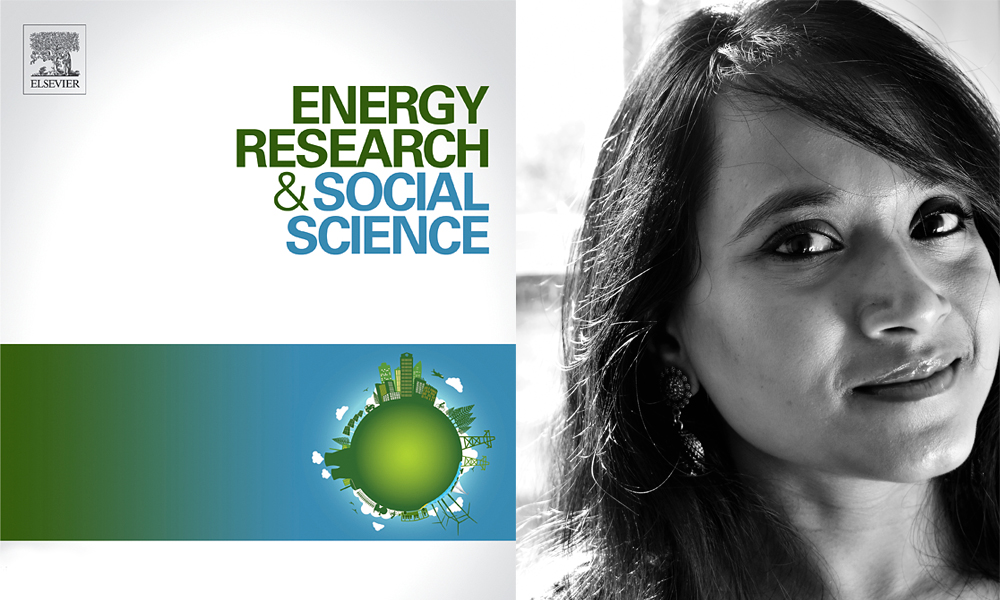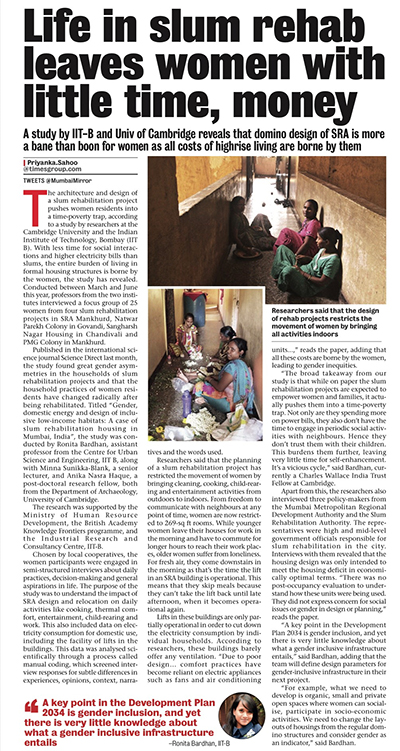Ronita Bardhan is Assistant Professor at the Center for Urban Science and Engineering at the Indian Institute of Technology Bombay. As the 2018–19 Charles Wallace India Trust Fellow, she is spending the Michaelmas Term at CRASSH.

Q. Ronita, congratulations on your new publication in Energy Research & Social Science. What is the article’s primary focus?
Titled Gender, domestic energy and design of inclusive low-income habitats: A case of slum rehabilitation housing in Mumbai, India, the article’s primary focus is to understand the social practices and energy decision-making in slum rehabilitation housing through a gendered lens. Especially in the urban context of the Global South, women’s involvement in domestic energy decision-making is an under-studied regime. The intention was to decipher the missing links and untangle the complex system of socio-cultural practices through which women exercise their decisions in constrained environments. This is more important because in the Global South women’s traditional role at home leads to them having far more influence than men on domestic energy consumption. Yet, men are key agencies of household decision-making. This makes a compelling case to study the ubiquitous links between the built environment, energy decisions and gender equality a reminder that there is no truly sustainable development without social equity and inclusivity. We took the case-study of Slum Rehabilitation Housing (SRH) in Mumbai, an emerging form of housing typology, within the urbanscape of Mumbai. The rationale for choosing Mumbai is multi-fold. The SRH is viewed as a deal breaker in the policy sphere, so much so that international governments in the Global South are aspiring to adopt it as their slum development policy. It is a success story of participatory urban planning which has yielded economic benefits for the government. The SRH is now viewed as the panacea for a slum-free city and hence will be scaled throughout the city. So much hype is difficult to resist. A closer look can make it evident that the benefits of SR policy are myopic. The way the housing is designed makes clear indications on the perpetuating inequalities.

Coverage of Ronita’s research in Mumbai Mirror. Read the article here.
Q. How did you conduct the research?
Energy is both a technical and teleological term mediated through various socio-cultural practices, especially when it comes to the urban poor. A quasi-qualitative approach was adopted to establish the causal relationships between women as agents of decision-making constrained by social practices and active recipients of welfare. The study is based on data collected in April 2018 that focused on semi-structured interviews with female occupants in four slum rehabilitation housing (SRH) projects in Mumbai. Focus group discussion and semi-structured interviews with representatives from the slum rehabilitation housings (SRH) and local communities forms the basis of the primary database. Personal interviews with the stakeholders of SR policy were conducted to avail in-depth insights of the social practices. The database was processed using systems approach based on Grounded theory. The systems analysis enabled in mapping the interconnected causalities between the key factors identified in the interviews and causal loop diagrams were used to understand the mechanisms of the complex system, based on the interview data, a FGD and reconnaissance.
Q. What drew you to your subject? Why do you think it is important?
Architecture and occupant behaviour has been my primary focus of research. The juxtaposition of my spatial association with Mumbai as Assistant Professor at IIT Bombay, and the SRH housing (from policy to practice) has been intriguing for me. I have been working on developing socio-technical solutions for thermal comfort, energy-efficiency, indoor-environment quality and health in the SRH. The economic success of SRH versus the socio-environmental efficiency of these houses provides a fascinating ground for research.
However, looking at this from the gender lens sprouts from an hour-long intense discussion with my co-author Dr Sunikka-Blank on how ‘energy’ and ‘gender-equality’ are the two most crucial challenges of sustainable development goals. A key point in the Mumbai’s Development Plan 2034 is gender inclusion, yet a quick chat with the stakeholder will reveal that very little knowledge exists on what a gender inclusive infrastructure entails. There were several ideas, which we decided to assimilate into a research proposal and a fellowship. This article is a collaborative product of the research grant from British Academy’s Knowledge Frontiers Programme 2017 and Charles Wallace India Trust Fellowship 2018–2019. We believe that gender equality can, should be influenced through energy and housing policies, and this research offers a conceptual framework for inclusive SRH to address the several disjunctures.

